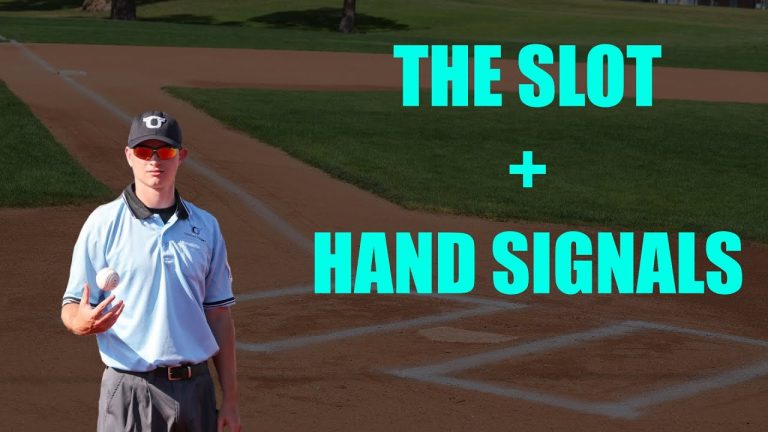
In the fast-paced world of baseball, effective communication between umpires and players is essential for a fair and smooth game. From signaling strike calls to managing conflicts on the field, communication techniques for baseball umpires play a vital role in maintaining order and ensuring accurate decision-making. In this article, we will explore some tried and tested techniques that umpires can employ to enhance their communication skills, fostering a harmonious and efficient environment on the diamond.
How is communication done by umpires?
Umpires communicate by raising both hands and calling “Time” in a loud and sharp voice to ensure that everyone on the field can hear them. It is crucial for all umpires to echo the call by signaling and, if there is play in progress, verbalizing “Time” as well.
What is the technology that assists baseball umpires in making accurate calls?
When it comes to getting calls right in baseball, technology plays a crucial role. In all major league parks and even in Class AAA stadiums, elaborate 12-camera systems are employed. These advanced systems measure various aspects of a pitch, including its spin rate, break horizontally and vertically, and velocity. With such precision, they can accurately determine whether a pitch is a ball or a strike. This technology ensures that umpires have the necessary tools to make accurate calls on the field.
The 12-camera systems used in baseball stadiums are nothing short of extraordinary. Equipped with cutting-edge technology, these systems provide umpires with a comprehensive analysis of each pitch. By measuring factors such as spin rate and break, they leave no room for doubt when determining the ball’s trajectory. This level of accuracy enables umpires to confidently make the right calls, improving the overall fairness of the game.
Thanks to these advanced camera systems, the days of relying solely on human judgment for ball and strike calls are long gone. Umpires now have access to precise measurements that leave little room for error. With technology on their side, baseball umpires can now ensure that every pitch is accurately assessed, bringing a new level of accuracy and fairness to the game.
How can I effectively communicate with an umpire?
When it comes to talking to an umpire, it is important to remember that arguing judgement calls will not get you anywhere. Instead, focus on maintaining control and respect. If you have a question about a rule, take a deep breath, call for time, and approach the umpire who made the call. By doing so, you can initiate a conversation in a calm and appropriate manner.
Engaging in a respectful conversation with an umpire requires a certain level of etiquette. Avoid getting caught up in disputes over strikes, balls, safe or out calls, as these are subjective judgement calls. However, if you genuinely want to discuss a rule, be sure to approach the umpire with respect and composure. Remember to call for time, get the umpire’s attention, and talk in a manner that is both appropriate and professional.
When approaching an umpire to discuss a rule, it is crucial to stay composed and in control. Take a moment to gather your thoughts, and then calmly approach the umpire who made the call you have questions about. By doing so, you demonstrate your willingness to engage in a constructive conversation, which increases the likelihood of getting a clear explanation or resolution. Keep in mind that maintaining a respectful and appropriate demeanor throughout the conversation is key to fostering a positive interaction with the umpire.
Mastering the Signals: Elevate Your Communication Game as a Baseball Umpire
As a baseball umpire, mastering the art of communication is crucial to your success on the field. Clear, concise signals can make all the difference in ensuring the game runs smoothly and efficiently. With a simple flick of your wrist or a nod of your head, you have the power to convey important decisions to players, coaches, and spectators alike. By honing your communication skills and perfecting your signals, you can elevate your game as an umpire and leave a lasting impression on everyone involved.
In the fast-paced world of baseball, every second counts. That’s why it’s essential for umpires to have clean and concise signals that can be easily understood by all. Whether you’re calling a strike, signaling a safe or out, or indicating a foul ball, your gestures should be clear and unmistakable. By mastering these signals, you can enhance your credibility as an umpire and ensure that your decisions are respected and accepted by players and coaches. So, why settle for mediocrity when you can elevate your communication game and become a true master of the signals?
Strike a Balance: Polishing Your Communication Skills for Optimal Umpiring Performance
Strike a Balance: Polishing Your Communication Skills for Optimal Umpiring Performance
Effective communication is the cornerstone of successful umpiring, requiring a delicate balance between assertiveness and approachability. Umpires must be able to confidently make decisions, assert their authority when necessary, and clearly communicate their rulings to players, coaches, and spectators. However, they must also maintain a friendly and approachable demeanor, fostering an atmosphere of respect and understanding. By honing their communication skills, umpires can ensure optimal performance on the field, establishing themselves as fair and reliable arbiters of the game.
Effective communication is the backbone of any successful team, and baseball umpires are no exception. By utilizing a combination of clear signals, confident body language, and assertive verbal cues, umpires can ensure that the game flows smoothly and all players, coaches, and spectators are on the same page. With proper communication techniques in place, umpires can confidently navigate the intricacies of the game, fostering a fair and enjoyable experience for all involved.
